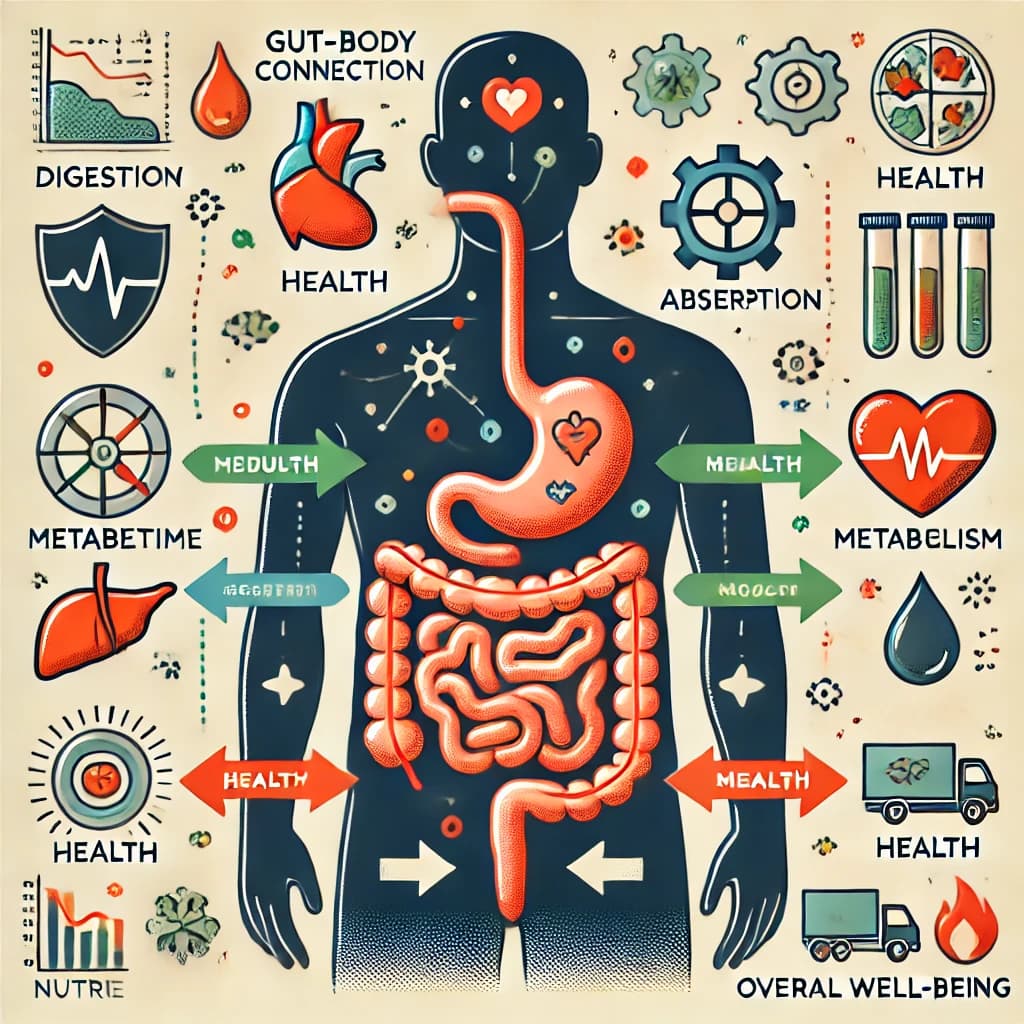Imagine your gut as a bustling metropolis, home to trillions of microscopic residents, bacteria, fungi, and other microbes that are working tirelessly to keep the city running smoothly. When everything is in harmony, nutrients are absorbed efficiently, metabolism hums along, and even your mood stays balanced. But when chaos ensues, thanks to poor diet, stress, or imbalances, this once-thriving city can turn into a site of dysfunction, affecting everything from digestion to mental clarity and weight management.
The gut isn’t just about digestion; it plays a central role in overall health. Let’s explore how it influences nutrient assimilation, mental well-being, metabolic function, and, most importantly, how you can optimize it for a healthier you.
1. The Gut’s Role in Nutrient Absorption
The digestive system is responsible for breaking down food and extracting essential nutrients that fuel every cell in your body. The gut lining acts as a selective barrier, allowing beneficial nutrients to enter the bloodstream while keeping harmful substances out. A well-balanced gut microbiome supports this process by:
- Producing enzymes that aid in breaking down macronutrients (proteins, fats, and carbohydrates).
- Synthesizing vitamins like B12, K, and certain B-complex vitamins.
- Enhancing mineral absorption, particularly calcium, magnesium, and iron.
An imbalanced gut- caused by chronic inflammation, food intolerances, or antibiotic overuse can impair nutrient uptake, leading to deficiencies that manifest as fatigue, weak immunity, or skin issues.
2. Gut Health and Mental Well-being: The Gut-Brain Axis
Ever had a “gut feeling” about something? That’s not just a metaphor, your gut and brain are in constant communication through the gut-brain axis, a network that connects the nervous system with gut microbes. About 90% of serotonin (the ‘feel-good’ neurotransmitter) is produced in the gut, meaning an unhealthy microbiome can contribute to anxiety, depression, and brain fog.
Research has shown that dysbiosis (an imbalance in gut bacteria) can lead to:
- Increased inflammation, which is linked to mood disorders.
- Impaired production of neurotransmitters like serotonin and dopamine.
- Higher levels of stress hormones, worsening anxiety and depression.
3. Gut Health and Metabolic Function: The Link to Weight and Chronic Disease
Your gut bacteria influence how efficiently you metabolize food and store energy. A diverse microbiome supports a healthy metabolism, while an imbalance may contribute to obesity, insulin resistance, and metabolic disorders like type 2 diabetes.
Key ways gut health affects metabolism:
- Regulating blood sugar levels and insulin sensitivity.
- Impacting appetite hormones like leptin and ghrelin, which control hunger and satiety.
-Affecting fat storage and energy expenditure.
An unhealthy gut can lead to chronic inflammation, which has been linked to conditions such as obesity, heart disease, and metabolic syndrome.
4. How to Improve Your Gut Health
Now that we understand the profound impact of gut health, how can we support it?
- Eat a Fiber-Rich Diet: Fiber from fruits, vegetables, legumes, and whole grains acts as a prebiotic, feeding beneficial gut bacteria.
- Incorporate Fermented Foods: Foods like yogurt, kefir, sauerkraut, kimchi, and kombucha introduce probiotics that enhance microbial diversity.
- Stay Hydrated: Water supports digestion and helps maintain a healthy gut lining.
- Reduce Processed Foods and Sugar: Excess sugar and artificial additives can promote harmful bacteria and inflammation.
- Manage Stress: Practices like meditation, deep breathing, and regular exercise help maintain gut-brain harmony.
- Prioritize Sleep: Poor sleep can disrupt the gut microbiome, leading to metabolic issues and inflammation.
Conclusion
Your gut is the gateway to good health. By nurturing it with a balanced diet, stress management, and healthy lifestyle habits, you can improve nutrient absorption, enhance mental well-being, and support metabolic health. The next time you consider your health goals, don’t forget to start with your gut, it’s the foundation of a thriving, resilient body and mind.










Responses (0 )